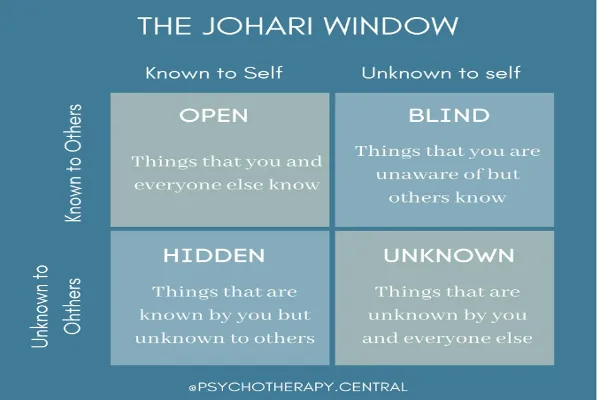
Blind Spots
I scoffed. I was a mental health provider. I had an extensive military background. I had done therapy and worked on myself. So, when my Life Coach asked me my level of self-awareness – I internally scoffed. I mean, of course I scored myself with a high self-awareness. Over the course of the next 12 weeks working with my Life Coach, my mind continued to expand and grow in ways that I had never considered. Not only did my self-awareness expand, but so did my joy, my focus, my intentions, and my life.
The question: How do we know we have blind spots if we are blind to them?
There is a framework called the Johari Window, designed by Joseph Luft and Harrington Ingham. It is a quad chart depicting 4 major areas of self-awareness. (See picture, credited to @Psychotherapy.central)
The Open Area: This is the stuff you know about yourself and others know too. Think of it as your public persona—the part of you that everyone at the office knows about, like your obsession with Taylor Swift or your emotional reaction to spiders.
The Blind Spot: This is the stuff others know about you, but you’re blissfully unaware. Perhaps you didn’t realize that you interrupt people more than a toddler with a new toy or that you are avoidant and push people away in personal relationships.
The Hidden Area: This is the stuff you know about yourself, but you’ve kept it under wraps. Maybe your inner voice is super judgmental about others – but it is never expressed or maybe you have an uncanny ability to quote every line from The Princess Bride. It is inconceivable (but true)!
The Unknown Area: This is the wild card—things neither you nor anyone else knows about you. Maybe you’re a latent world-class salsa dancer or a future Olympic winner like Kristen Faulkner who started cycling for fun 6 years before winning gold in the 2024 Olympics!
All four areas bring new and insightful areas of self-awareness growth to consider.
Embrace the Blind Spot
This is such an interesting opportunity for growth but it can be scary to delve into areas the unknown. We can feel attacked and act defensive. Critiques can rock us on our heels if we are not ready for it. Here are two small starting points to start to unveil the Blind Spot.
First: Stay curious. When we are in a place of curiosity, we are able to ask questions, be more open to input, and even dive a little deeper for the sake of learning more. This can look like asking questions over defensive statements. “Can you tell me more about that?”
Second: I encourage safe people to start with. Know that safe people are also biased (hopefully in your favor) but you may be able to build confidence for asking for feedback when you have practiced with friends, family, co-workers who would answer honestly and kindly. Think of honest friends (not frenemies); mentors (who are looking out for your development); and family who you find comfortable to have difficult conversations with (not the family from Thanksgiving horror stories).
Growing in the Hidden Areas
Growing in our hidden areas is really about opening up to share parts of us that may feel shame or judgment. Sharing Hidden Areas can be liberating. Allowing others to know that side of you is a gift for both of you. You get to share and be accepted for your Hidden Self, and you provide an opportunity for another person to show up for you in a new way. This can create new bonds and they’ll likely have their own stash of quirks that make your dance moves look like the height of normalcy.
The Magic of the Unknown Area
The Unknown Area is where the magic happens—or at least where the unexpected surprises arise. This is an area where a Life Coach may bring out a whole unconscious side you never realized. I learned with my Coach how to set intentions for how I want to show up with people. How I wanted to express myself, how I wanted to adjust my posture, my facial expressions, or even my hand gestures while driving on I-10 in downtown Houston! It was something I never considered. You too can learn new ways to think, see, and go after life that you never considered. Approach this area with a sense of adventure and humor. After all, who knows what hidden talents or weirdness might make an appearance?
Embracing the Journey
Navigating through the Johari Window is a bit like being the star of your own reality show—complete with awkward moments, revelations, and the occasional plot twist. Embrace it all with curiosity and a bit of humor. Self-awareness doesn’t mean you’ll suddenly become a perfect, polished version of yourself. Instead, it’s about recognizing and appreciating the quirks that make you uniquely you.
So, the next time you catch yourself in a moment of self-discovery, remember: whether you’re in the “Blind Spot,” “Hidden Area,” or exploring the “Unknown,” it’s all part of the hilariously imperfect journey of being human and the importance of growth in self-awareness. What you learn may surprise you and it may bring opportunities beyond self-growth that lead to joy, increased focus, intentional living, and a more fulfilling life.

